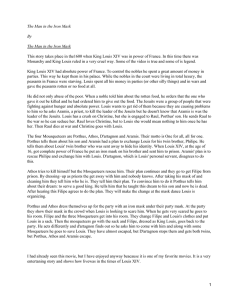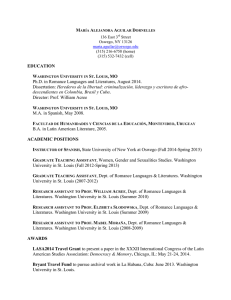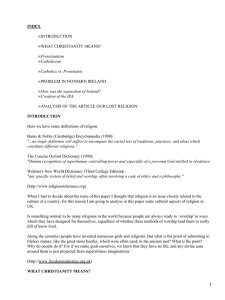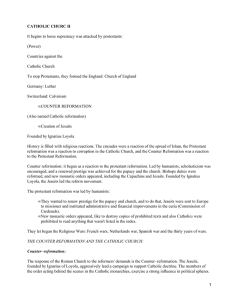chapter 48 : pre-revolutionary france
Anuncio
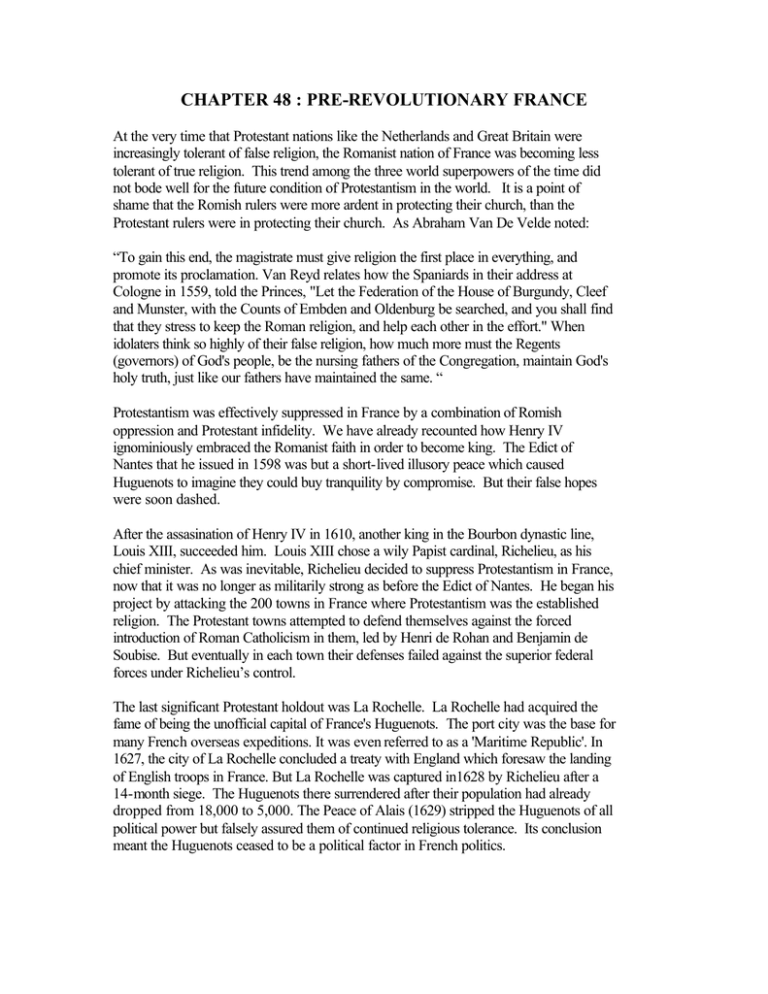
CHAPTER 48 : PRE-REVOLUTIONARY FRANCE At the very time that Protestant nations like the Netherlands and Great Britain were increasingly tolerant of false religion, the Romanist nation of France was becoming less tolerant of true religion. This trend among the three world superpowers of the time did not bode well for the future condition of Protestantism in the world. It is a point of shame that the Romish rulers were more ardent in protecting their church, than the Protestant rulers were in protecting their church. As Abraham Van De Velde noted: “To gain this end, the magistrate must give religion the first place in everything, and promote its proclamation. Van Reyd relates how the Spaniards in their address at Cologne in 1559, told the Princes, "Let the Federation of the House of Burgundy, Cleef and Munster, with the Counts of Embden and Oldenburg be searched, and you shall find that they stress to keep the Roman religion, and help each other in the effort." When idolaters think so highly of their false religion, how much more must the Regents (governors) of God's people, be the nursing fathers of the Congregation, maintain God's holy truth, just like our fathers have maintained the same. “ Protestantism was effectively suppressed in France by a combination of Romish oppression and Protestant infidelity. We have already recounted how Henry IV ignominiously embraced the Romanist faith in order to become king. The Edict of Nantes that he issued in 1598 was but a short-lived illusory peace which caused Huguenots to imagine they could buy tranquility by compromise. But their false hopes were soon dashed. After the assasination of Henry IV in 1610, another king in the Bourbon dynastic line, Louis XIII, succeeded him. Louis XIII chose a wily Papist cardinal, Richelieu, as his chief minister. As was inevitable, Richelieu decided to suppress Protestantism in France, now that it was no longer as militarily strong as before the Edict of Nantes. He began his project by attacking the 200 towns in France where Protestantism was the established religion. The Protestant towns attempted to defend themselves against the forced introduction of Roman Catholicism in them, led by Henri de Rohan and Benjamin de Soubise. But eventually in each town their defenses failed against the superior federal forces under Richelieu’s control. The last significant Protestant holdout was La Rochelle. La Rochelle had acquired the fame of being the unofficial capital of France's Huguenots. The port city was the base for many French overseas expeditions. It was even referred to as a 'Maritime Republic'. In 1627, the city of La Rochelle concluded a treaty with England which foresaw the landing of English troops in France. But La Rochelle was captured in1628 by Richelieu after a 14-month siege. The Huguenots there surrendered after their population had already dropped from 18,000 to 5,000. The Peace of Alais (1629) stripped the Huguenots of all political power but falsely assured them of continued religious tolerance. Its conclusion meant the Huguenots ceased to be a political factor in French politics. King Louis XIII was succeeded by King Louis XIV, otherwise known as the Sun King. Louis XIV reigned from 1643 to 1715. In 1642, Louis had no court "favorite". (A court "favorite" means a close friend, usually a sodomite lover at court, who often had a major influence on the king's decisions). Richelieu had introduced a young man named Henri Coiffier de Ruzé, Marquis of Cinq-Mars, to Louis, hoping Louis would take Cinq-Mars as a lover. The cardinal believed Cinq-Mars was easy to control. Instead, the marquis tried to convince the king to have Richelieu executed, and when Cinq-Mars took matters into his own hands, Richelieu had him imprisoned and then executed. Although the king approved the execution, the death of Cinq-Mars appears to have driven a wedge between him and the cardinal. Although Richelieu strengthened France in its political status among the nations of the world, he greatly corrupted life within France. He oppressed the godly, and he encouraged the ungodly. The cardinal had a special love of theater, which rightly was not considered a respectable art form at the time. The historian R.J. Knecht has said, "It was largely thanks to his patronage that the acting profession acquired social respectibility after 1635." He established a network of internal spies within France, turning it into a police state with power concentrated in the central government. And he chose a successor, Cardinal Mazarin, who was as wicked as himself. Cardinal Mazarin served as Louis XIV's chief minister from 1642 until his death in 1661. From 1661 until 1715 Louis XIV assumed direct autocratic rule over France. Mazarin continued Richelieu's policy of more subtle suppression of the Protestants. But King Louis XIV, urged by the French Catholic clergy, moved to suppress the dissident religion more harshly. Conversion was encouraged; the Edict of Nantes was interpreted in the strictest way possible; and dragoons were quartered in the homes of Huguenots. Louis XIV still allowed the Huguenots some limited freedoms until he married the staunch Catholic, Madame de Maintenon, in 1684. Then he revoked the Edicts of Nantes in 1685 and declared Protestantism illegal with the Edict of Fontainebleau. Strenuous efforts were taken by the state to force the conversion of any remaining members of the Protestants. Ministers of the faith were given two weeks to leave France while their congregation was denied the right to exit. If the ministers did not leave they were arrested and forcibly removed from the country. Huguenots were prohibited from joining some trades and professions, and excluded from public office. Severe restrictions were put on Huguenots practicing medicine and law, arbitrary and discriminatory taxes were levied, and those who could not prove that they had converted to Catholicism were not allowed to be beneficiaries of deceased estates. Children were forcibly removed from their parents and placed in homes where they could be raised as Catholics, which caused great anguish. Protestant reaction was swift. Since entire industries were controlled by the Huguenots and because their wealth and industry was important to the economy, it was very important to keep these people in France. The Huguenots constituted one of the most industrious and economically advanced elements in French society. Soldiers were stationed at the borders of France to prevent their emigration. They were then pushed back to their villages and forced to convert to Catholicism. Nevertheless, an estimated 300,000 people were able to get out of the country and took their money, skills and industry to the other countries which profited from these new immigrants. Entire provinces in France were depopulated as countless Huguenots fled to England, the Netherlands, Germany (especially Protestant Prussia), Switzerland, South Africa, and America. The only important fragment of Huguenots left in France was in the Cévennes region of France, where the war of the Camisards (1702–10) broke out. Led by the young Jean Cavalier and Roland Laporte, the Camisards sought to defend themselves from the ruthless attacks of the French central government. They met the ravages of the royal army with guerrilla methods and withstood superior forces in several battles. In 1704, Marshal Villars, the royal commander, offered Cavalier vague concessions to the Protestants and the promise of a command in the royal army. Cavalier’s acceptance broke the main body of defense, although others, including Laporte, refused to submit unless the Edict of Nantes was restored. Scattered fighting went on until 1710 until all resistance was eventually crushed. Thus France ridded itself of almost all gospel light. The Enlightenment movement was blossoming at this time, and France was its chief flower. Louis XIV's reign was characterized by French global cultural dominance. French was the language of culture in the 17th century in the way that English is today the global language of business. But cultural domination came at a price. Louis XIV was an incredibly extravagent spender, dispensing huge sums of money to finance his wars and his "enlightened" court. Some estimates conclude that by the end of Louis' reign half of France's annual revenue was spent on maintaining his palace at Versailles. Also, large amounts of money were wasted because of corruption within the large French bureacracy. The taxes to pay for this extravagance were largely borne by the peasants, since the nobles and clergy were exempt from the taxes. But even with high taxation, France's national debt grew at an alarming rate. Although the Enlightenment promised men peace through human reason, France engaged in wars one after the other. Following the seizure of the (then separate) English, Irish and Scottish thrones by the Dutch prince William of Orange in 1688, the antiFrench "Grand Alliance" of 1689 inaugurated more than a century of intermittent European conflict in which Britain would play an ever more important role, seeking in particular to keep France out of aggression in the Netherlands. After the war of 16891697 gained France only Haiti, the War of the Spanish Succession (1701-1713) ended with the undoing of Louis's dreams of a Franco-Spanish Bourbon empire. On the 8th of March 1715 Louis XIV dared to announce that he had put an end to all exercise of the Protestant religion, after all the years in which he had oppressed the true religion. Yet, while the king was dying at Versailles, there assembled together at Monoblet in Languedoc, under the presidency of a young man twenty years of age, Antoine Court, a number of preachers, as the pastors were then called, with the object of raising the church from its ruins. This was the first synod of the Desert. Court devoted his life to the re-establishment of the Reformed churches, which earned for him the name of the Restorer of Protestantism. Despite persecution, the Protestants continued their assemblies; the fear of death and of the galleys were alike powerless to break their resistance. On the demand of the clergy all marriages celebrated by their pastors were declared null and void, and the children born of these unions were regarded as bastards. Protestantism, which persecution seemed to have driven from France, drew new life from this very persecution. Outlawed, exiles in their own country, deprived of all civil existence, the Huguenots showed an invincible heroism. The history of their church during the period of the Desert is the history of a church which refused to die, by God’s grace. Amongst its famous defenders was Paul Rabaut, the successor of Antoine Court. Year by year the churches became more numerous. In 1756 there were already 40 pastors; several years later, in 1763, the date of the last synod of the Desert, their number had increased to 65. The question of Protestant marriages roused public opinion which could not tolerate the idea that Frenchmen, whose sole crime was their religious belief, should be condemned to civil death. The torture of Jean Calas, who was condemned on a false charge of having killed his son because he desired to become a Catholic, caused general indignation, of which even the wicked Voltaire became the eloquent mouthpiece. Ideas of tolerance, of which Bayle had been the earliest advocate, were gaining sway, as Enlightenment ideas concerning religious toleration were becoming more generally accepted. It turned out to be this very Enlightenment which eased overt persecution of the Protestants, which would yet fell true Biblical Protestantism as well. As Protestants placed more confidence in Enlightenment secularism, and abandoned their intolerance for false religion, true Protestantism declined- albeit gradually. The 18th century witnessed a long series of struggles between England and France for colonial empire. But alliance with the traditional Habsburg enemy against the rising power of Britain and Prussia led to costly failure in the Seven Years' War (1756-1763). The Treaty of Paris (1763) ending the war marked the loss by France of its dominions in America and its power in India. Louis XVI therefore began his reign in 1774 under inauspicious circumstances. France had already chased away most of her God fearing citizenry. She was left with a morally bankrupt state and church and population. She was becoming buried in debt. Her colonial empire was being significantly reduced. Her rulers were unjust. And, perhaps most foreboding, she had Enlightenment philosophers in her midst like Voltaire and Rousseau who suggested popular revolution as a remedy for these ills. Having rejected the remedy of the gospel, she was left with solutions that would only make matters worse. BIBLIOGRAPHY CHAPTER 48 : PRE-REVOLUTIONARY FRANCE This second volume in a two-part series on church history is primarily an edited version of the following works on church history and Biblical interpretation: James A. Wylie, The History of Protestantism (Cassell & Company, Limited: London, Paris & New York. 1878). (see electronic version at http://www.whatsaiththescripture.com/Fellowship/James.A.Wylie.html ) Philip Schaff, History of the Christian Church (Logos Research Systems, Inc.: Oak Harbor, WA, 1997). (see electronic version at http://www.ccel.org/s/schaff/history/About.htm ) J. Parnell McCarter, Sabbath Bible Survey Tests and Assignments (PHSC: Grand Rapids, MI, 2003). (see electronic version at http://www.puritans.net/curriculum/ ) J. Parnell McCarter, Let My People Go (PHSC: Grand Rapids, MI, 2003). (see electronic version at http://www.puritans.net/curriculum/ ) The on-line resources of Historicism Research Foundation at http://www.historicism.net/ also proved invaluable for my understanding of Biblical prophecy. Biblical prophecy concerning Christian church history, especially as revealed in the book of Revelation, serves as the foundation upon which all church histories should be based. Other references especially consulted for this chapter include: www.wikipedia.org http://www.zum.de/whkmla/military/17cen/larochelle16271628.html The Columbia Encyclopedia, Sixth Edition. 2001., http://www.bartleby.com/65/hu/Huguenots.html http://www.witness.com.au/huguenot_history.htm http://www.next1000.com/family/EC/huguenot.hist.html
